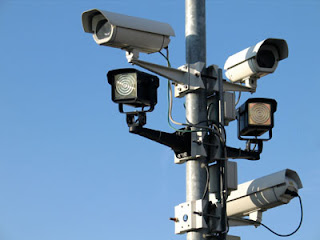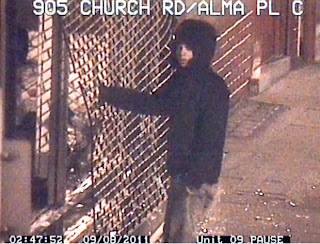
Surveillance: Is the monitoring of the behavior, activities, or other changing information, usually of people for the purpose of influencing, managing, directing, or protecting.
http://en.wikipedia.org/wiki/Surveillance
Surveillance is actually French for "Looking Over".
In our community today, we have constant devices at our reach, for example laptops and mobile phones, we see this as a good thing as we upload to our friends all the amazing things we are doing every moment of the day, but is it really a good idea when random people can read this as well? People we hardly know can now find out almost anything they would like to know about us. With websites such as Face book, people can now see where we currently study or work and even where we live.
But is this the greatest threat of surveillance? Not many people know, but when out in public they are having their every move watched, a majority of our popularity is completely oblivious of this, only knowing that we are being watched in certain places. This is of course good for catching criminals in robbery's and attacks, but what about our normal everyday privacy?
In the link below, we can see a young girl that got sacked for uploading comments about how she was bored at work.
http://news.bbc.co.uk/1/hi/england/7915049.stm
This just shows how much an impact social websites can have on your daily lifestyle just by writing the slightest wrong thing.
Another new, and slightly worrying add to Face book, is the option of allowing people to see your exact where abouts when you update your status, allowing everyone to know where you are at all times. A good idea if something terrible happens to you and people need to find out your whereabouts, a bad idea seeing that stalkers could be the reason behind you going missing.
Whilst scanning peoples opinions on whether they found surveillance fair or not, I found this page on Yahoo, http://au.answers.yahoo.com/question/index?qid=20070829181118AA7wtEk. Someone had quoted that video surveillance as "The eye witness that doesn't lie". On this page many people respected, but also pointed out CCTV is not good when it violates peoples private life.
In an article a found on line, which explains how all tweets are going to be handed over to the government for "Interesting information" and will be treated as "Historical documents" shows just how little privacy we are actually getting these days. The idea that the public posting about family issues or trips they will be taking are seeing as "historical documents" absolutely bewilders me. They comment at the end of the article saying "In the electrconic age, privacy is increasingly becoming a quaint concept of the past" which I find completely true, to keep something private these days is extremely hard no matter what lengths you go through, it seems that everyone around you knows everything about you. http://www.naturalnews.com/034356_tweets_surveillance_government.html
A second article I found totally discriminates the use of Cameras, explaining to us that cameras don't actually do the job they are meant to when it comes to catching criminals, saying that half the time you can't actually identify the faces on the screen, and calling the police "lazy" for not actually monitering them at all times. A part of it also explains a deliberate sign on crossing a privacy barrier by saying " Their inevitable misuse is another cost; police have spied on naked women in their own homes, shared nude images, sold best-of videos and even spied on national politicians." A obviously very worrying quote, which almost wants you to keep your curtains shut at all times just to get some sort of privacy for yourself. http://articles.cnn.com/2010-02-25/opinion/schneier.security.cameras_1_cameras-cctv-footage-police-officer/2?_s=PM:OPINION
The video above is a very graphic and interesting video online of someones concept on what they think the streets will be like in the future if surveillance carrys on like it is now. Could this really be the future we are set for? Fun right?
Surveillance Society - Liberty's position on human rights and privacy
Databases - The government hold personal information thus, this raises questions about data security and how secure is your personal information?
State Surveillance - Highly intrusive state-sanctioned surveillance powers currently do not require judicial authorisation and increasingly large numbers of bodies have access to surveillance powers, including all local authorities.
National DNA Database - Over 5 million people have their DNA stored, many of whom have never been charged with, let alone convicted of any offence. It is the largest per capital DNA database in the world.
CCTV & ANPR - There is very little regulation of visual surveillance, even though there are CCTV cameras, automatic number plate recognition and technology which captures and store images is commonplace.
Criminal Record Checks - Vast numbers of employers have direct access to individual criminal records, including unsubstantiated allegations.
ID Cards - The New Labour government introduced a system of ID cards, linked to a ‘National Identity Register’ which could have held potentially unlimited amounts of information about every individual. The Coalition government passed the identity documents act, which repealed ID cards and the national identity register. ID cards which have already been issued have become de functional. Liberty was at the forefront of the campaign against ID cards. - (Source- http://www.liberty-human-rights.org.uk/human-rights/privacy/index.php)
 However, take the London Riots that happened in August 2011, surveillance was heavily used to catch people doing robberies and eventually arrest these people. Seeing as a lot of the riots were organised over BBM, and free chat app on BlackBerry, police actually started to also monitor mobile phones.
However, take the London Riots that happened in August 2011, surveillance was heavily used to catch people doing robberies and eventually arrest these people. Seeing as a lot of the riots were organised over BBM, and free chat app on BlackBerry, police actually started to also monitor mobile phones.http://vigilantcitizen.com/latestnews/london-police-using-surveillance-system-to-monitor-mobile-phones/ http://www.agentura.ru/english/projects/Project_ID/londonriots/
This website I will post below, shows a selection of quite graphic and devastating videos from the London Riots, including one of a young man that got beaten to the floor and then robbed.
http://abcnews.go.com/Technology/london-riots-violence-caught-surveillance-cameras/story?id=14273894#.T51RfquudLc
Whilst researching I also read up on a type of surveillance called "Disease Surveillance", this monitors disease within a community, it helps notice to patterns which happen through diseases. By doing this hopefully the spread of diseases will minimize.
During the SARS outbreak in early 2004, for example, the Beijing staff of the WHO produced updates every few days for the duration of the outbreak.[1] Beginning in January 2004, the WHO has produced similar updates for H5N1.[2] These results are widely reported and closely watched.
http://en.wikipedia.org/wiki/Disease_surveillance
No comments:
Post a Comment